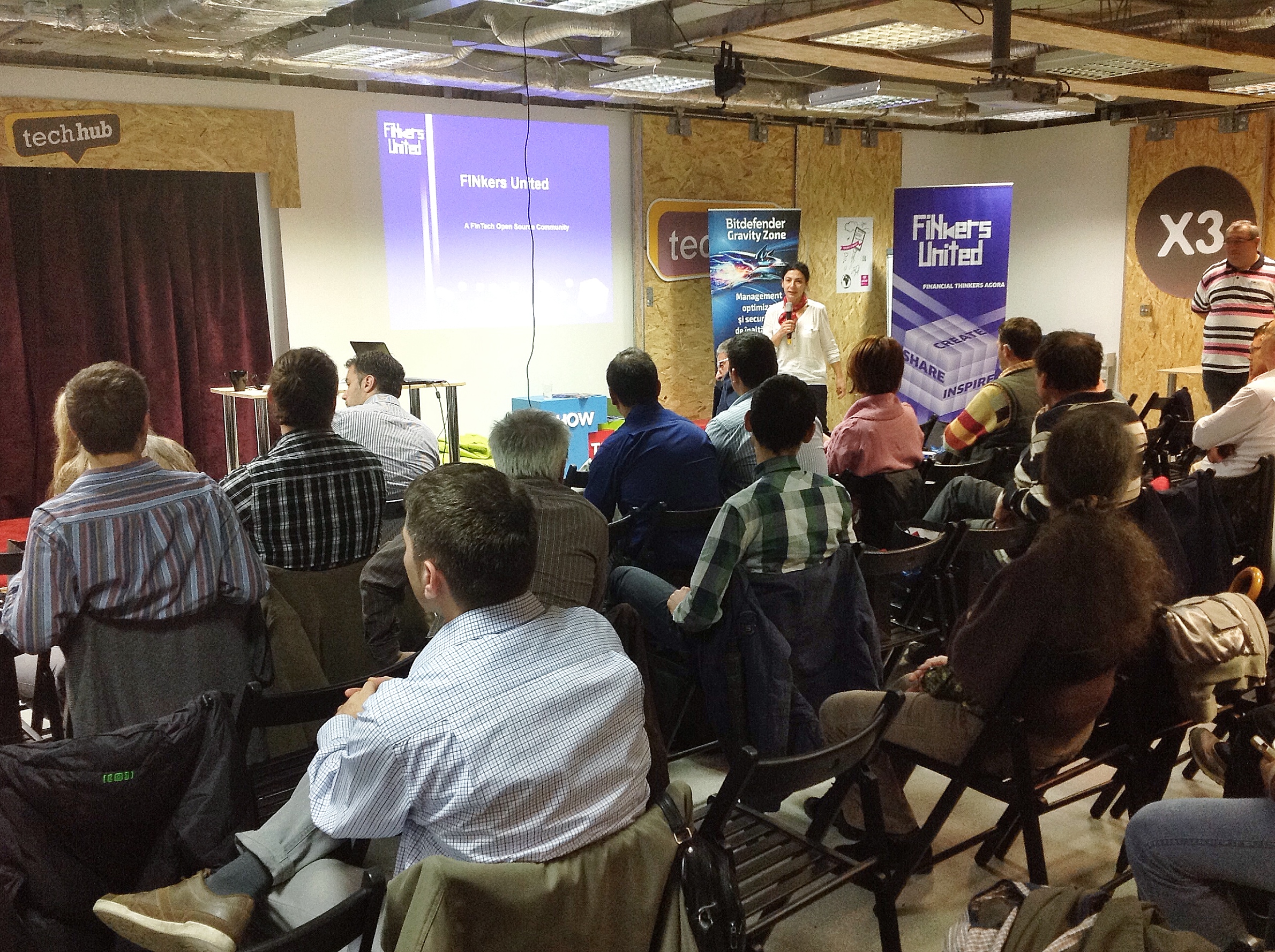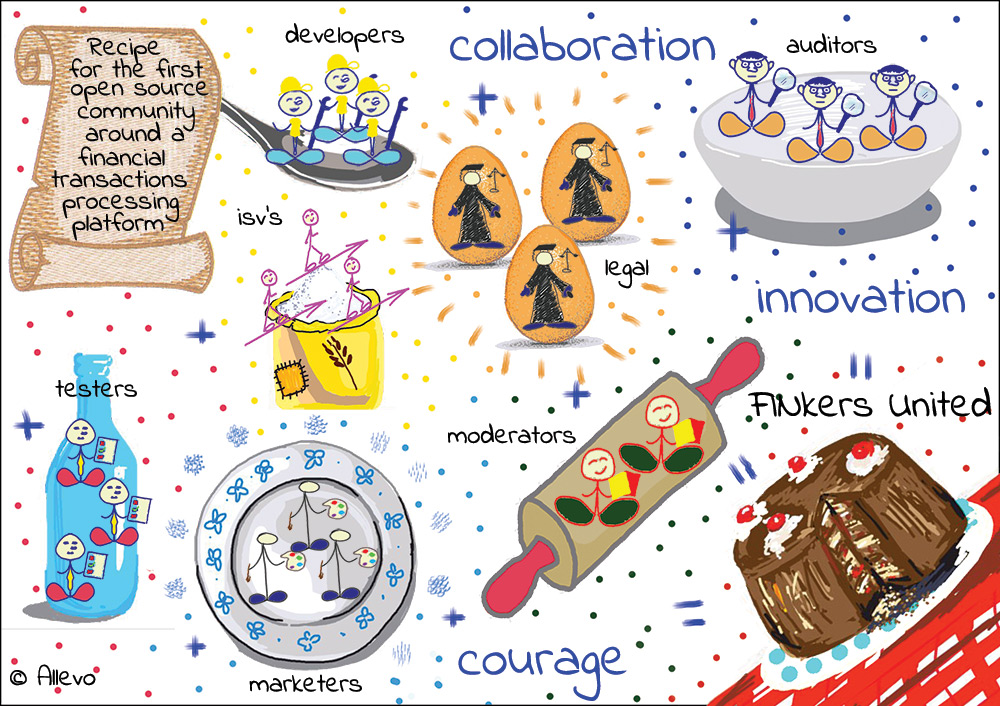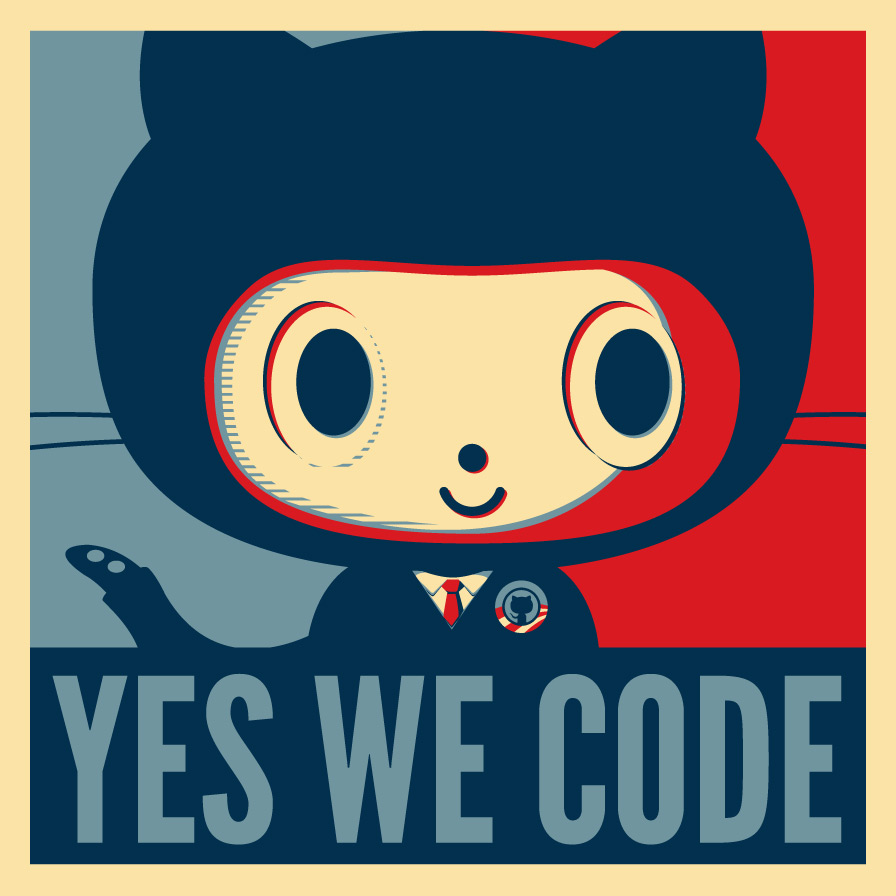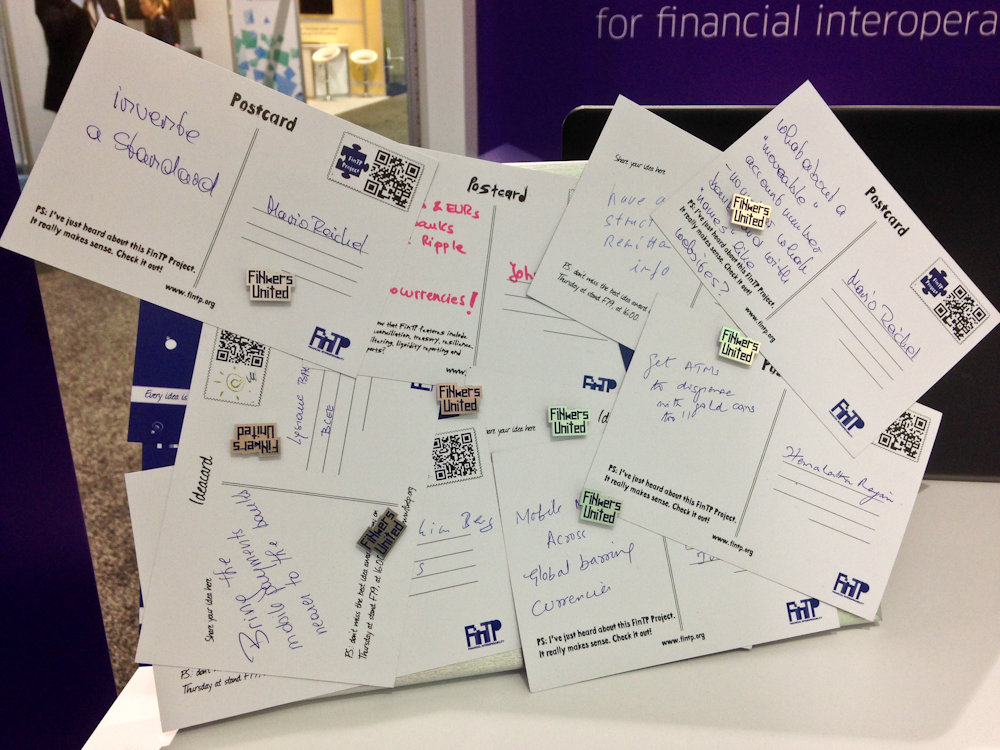FINkers United is all about sharing and now it’s time to share the holiday spirit. We wish all of you only joy and happiness for the holiday season and the new year to come.
Year: 2014
Busy fall for Allevo. We showcased FinTP, the FINkers United open source community and the BOOST project, which includes both, in the most notorious events of our business focus and region: Internet and Mobile World 2014, Sibos Boston, SWIFT Business Forum Romania, LOAD, RICAP, The Future of Electronic Payments and others. Well, you all know that since the launch of the FinTP Project, earlier this year, we at Allevo have been quite active in promoting it. FinTP has been featured online on Allevo’s blog, on FinTP’s blog, on sibos.com, in print magazines and in focused industry events.
So here’s a recap of what we’ve done this fall:
Internet & Mobile World 2014 8-9 October Horia Beschea, Allevo CTO and President of the FINkers United association, was invited to keynote the Business Software, Cloud & Infrastructure stage at Internet & Mobile World conference in Bucharest, October 2014. He presented BOOST project, which includes both the FinTP application and the FINkers United open source community. 50% of the companies on site were offering cloud services, which fit the topics debated in conference sessions, such as cloud computing, internet of things, big data, user experience, visualization etc. Jacob Benbunan, CEO, Saffron Brand Consultants said something we fully relate to: “Forget about closed systems”. Dr. Vasile Voicu, Product Management Business Segment, Telekom Romania, presented trends for 2016: over 10mld mobile devices connected to the internet, out of which 8mld are mobile phones.
RICAP 15 October RICAP helps Romanian technology entrepreneurs and innovators to develop their businesses and take their products to international markets. The program builds on Larta Institute’s long established “network-centric” methodology successfully implemented over 20 years in 17 countries. Over 9,700 innovators have been assisted through Larta’s commercialization practice. Allevo has been part of the RICAP program and was invited as a member of their alumni to present the process of delivering FinTP. What was considered disruptive innovation in Allevo’s case was the idea of compromising the core business and the main streams of revenue by migrating to a completely different business model. This was the open source model. The time we took to define and refine how this was going to work for us was happening while we were part of their programme and the participants of this round were shown a success story of how a company can break the ice and become different. More about the community of RICAP companies, mentors and advisors, and what they were up to during the first stage of the program is available on their blog.
The future of electronic payments 16 October Andrei Dutescu, Business Analyst at Allevo, was invited to participate in the Regulations panel at The future of electronic payments event organized by Oxygen events. He talked about Allevo’s initiative called BOOST (Banking On Open Source Technologies) and about the 3 components of BOOST: 1) FinTP Project, an open source financial processing application 2) FINkers United, the open source community behind the FinTP Project and 3) the new business model of Allevo. The concept of open source software and how banks have started recently to support the adoption of these products in favor of proprietary software was also discussed. At the end of the presentation questions were asked from the audience mostly related to the FINkers United open source community and about its members, which seemed to attract everyone’s attention.
LOAD (Linux Open Alternative Days) 23 October TechHub hosted on October 23rd the Linux Open Alternative Days (LOAD), an annual event dedicated to Linux and open source technologies, which has reached its 9th edition this year. As LOAD is meant to create a strong community among supporters of the open source philosophy, there was no better place to present our FINkers United open source community and the project it is built around, FinTP. Therefore, we delegated Denisa Agatie, co-founder of FINkers United and member in its board, to talk to the audience about the FinTP Project and the challenges of creating and maintaining an open source community in the FinTech space.
SWIFT Business Forum Romania 30 October Already at its fifth edition, the SWIFT Business Forum Romania has become an annual event organized by the Romanian Banking Association that brings together key decision makers, people with business focus or from the operations area of the local banking community, key people from SWIFT and from the local solution provider community. As usual, there were a few words of introduction from Mr Radu Gratian Ghetea, President of the Romanian Banking Association, a brief of the SWIFT 2020 strategy and on SWIFT’s pricing policy, SWIFT solution presentations, a panel on regulations and standards, a compliance outline and an innovation panel. Allevo has presented its BOOST project during the chatroom sessions. Allevo CEO, Corina Mihalache, joined the innovation panel, next to Rodica Tuchila, Ruud van der Horst and Felix Enescu to discuss openly about opportunities and challenges brought by the Internet of things and the digital bank, a debate on the future of banking and financial services.
Two movies were played to set the scene and introduce discussion topics: IoT and Banking and BOOSTing Banks.
The key points of discussion loomed around facts that can be seen in financial services. We’ve seen a lot of new technologies lately in the FinTech space. Is it correct to assume entry is fairly easy, but that these new entrants, startups and customer oriented services do need banks for basic operations such as settlement etc? However, if the likes of paypals, zebras and so on out there take too much of the business that banks would have normally been doing, don’t banks need to redesign their service offering to accommodate the growing customer demand?
Banking is definitely powered by software and today’s requirements for lowering TCO and complying to standards and regulations are adding restriction after restriction. Does it make sense to buy and maintain this many types of software licenses and keep everything developed and implemented on a one-time basis or would it make sense for all banks to unify their behind the scenes operations flows and look into open software that can accommodate this? How are big players in the market dealing with the need to innovate and still remain relevant in FinTech?
TechHub hosted on October 23rd the Linux Open Alternative Days (LOAD), an already traditional event dedicated to Linux and open source technologies, which has reached its 9th edition this year.
As LOAD is meant to create a strong community among supporters of the open source philosophy, there was no better place to present our FINkers United open source community and the project it is built around, FinTP.
Therefore, we delegated Denisa Agatie, co-founder of FINkers United and member in its board, to talk to the audience about this project and the challenges of creating and maintaining an open source community in the FinTech space.
The presentation was received with interest and we were happy to see people reading the FINkers United for Dummnies Brochure during the event.
For more information on how you can contribute click here.
Here’s the recipe for creating an open source community in the financial world.
Denisa Agatie of FINkers United will fill you in on the details tomorrow at the LOAD (Linux Open Alternative Days) event.
http://bucharest.techhub.com/events/load-2014-linux-open-alternative-days
Join us at the event tomorrow!
In the beginning… It all started with the challenge of finding the best sharing and versioning environment that will best accommodate our needs for building a strong and creative community around the FinTP project. It would have to allow collaboration among a large number of scattered contributors.
Finally, out of the hat there came out our rabbit, GitHub! We have to say we were also influenced by the large number of open-source projects it hosts.
My new world vs. my old world I started using Git having a Subversion background (have been a SVN user for a short while). The first impulse was to “translate” the SVN commands into Git ones. It turned out not to be such a bright idea. In order to make the best choices it is essential to understand Git functions and what makes it different. One thing is that “committing“ no longer meant that everyone contributing to that branch will be aware of my changes within the code. Being a contributor (as opposed to a committer) I am not allowed to make direct push into the master branch, that is, the location where the FinTP source code corresponding to that project is stored. In this case, I had to fork and clone the master branch locally and just work there and commit. Once I feel like my code is ready to face the world, I get online and push my code into the initial forked branch. To announce the software maintainer that I am ready to release my code into the community, I have to initiate a pull request. The software maintainer will decide, following an interactive review session, upon merging conditions: should it be merged as such or should it be improved.
Local vs. remote repository The main idea is to allow you to work on your own, without being forced to interact with the central remote repository. Yeah, I also wondered what the heck is the remote repository? Mainly it is the single central repository of any project that serves as a hub for contributors, who may or may not access it while coding. When you clone it on your local machine, then you get, what else?, a local repository. Be careful not to overlook the corresponding documentation, usually organized as a wiki site, which will prove to be handy. Actually, this way of working (fork→clone→code→commit→push/pull request→review→merge) is what makes Git so suitable for working in FinTP projects (this is where you can find them https://github.com/FinTP). I know it may look a bit complicated, especially if you compare it to SVN, and that over pushing, pulling and merging of the same files might become annoying at times, but I guess each of them is more or less suitable under specific working conditions (SVN is easier to manage when few developers are working on the same branch and bring changes to the same source files).
I found it useful to stage only specific parts of my code, may those be urgent issues or already perfect code. The staging area is like a buffer zone where you may add the code that will get shipped away. As FinTP is still in its early stage, it is usually about the code that is ready to be integrated in the already existing one. You have the possibility to choose how to interact within projects. I personally started by trying to use solely the GitHub application to push my commits, but, after some silly commits and some conflicts that could not be solved by the application; I gave up and shifted to Git bash, although I am not a CLI fan. It is a bit hard at first, but in my opinion it is totally worth it.
Branches Another important aspect that Git provides is the possibility to make several branches both on the local and remote repository. Thus, because of our need for working in a team, we have adopted two workflows. When a team of contributors is coding on the same project we go for a centralized workflow: all members are using the remote repository as a single entry-point for all changes brought to the project. Thus, beside the master branch on the remote repository, we use a development branch in which we push changes. The development branch is merged into the master one when the contributors agree that they have a stable release. On the local repository I have a master branch, a development branch and several feature branches. The main branches of the project are master and development. The master branch contains only ‘production-ready’ states of the project, while the development branch contains the latest development changes that will be included in the next release. On the development branch, nightly or merge-triggered builds (whatever comes first) are run. That means that the build will always include the latest merges. Master merges are equivalent to a new production release and actions that come with it (version increment, build label, build on some production machines) are automated. Distributed workflows: one type of supporting branch is the ‘feature branch’. When starting developing a new feature I create a new local feature branch that will be merged into the development branch as soon as the work is complete (the code is reviewed and documented, at least by relevant comments). Currently, on the projects I contribute to, there are no remote feature branches, but I have created several local branches. One can add several other supporting branches, such as release or hot fixes branches.
Message to potential contributors Using Git is awesome and it aims at making your work as smooth as possible. It is probably one of the best tools supporting large worldwide communities sharing the same interests in a collaborative environment. For start, just fork our project and start coding. Then push your commits. As soon as you have any doubts about the best course of action you may find useful information here https://help.github.com/. Anyway, if you are a beginner eager to contribute and feel that reading is just consuming too much of your time, we will be glad to offer our support.
As you might have seen, we organized at Sibos the first FinTP Idea Contest.
There were interesting ideas submitted in the competition and I just wanted to share with you some of the most appreciated ones:
Send USDs and EURs between banks using the Ripple protocol. Cryptocurrencies!!
Automate payments and B2B platform using FinTP in a local project.
Have a long structured remittance info
Push EBICS to Eastern Europe
Mobile money across global business currencies
Invent a standard
What about a “movable” account number – no matter what bank – and with “names” like websites?
There were even things we did not think of, so this contest was a very good idea in itself. But all ideas will be taken in front of the FINkers United board for further consideration. The board will select those fit to be planned for future releases of the FinTP Project.
Out of so many good ideas, one was ranked highest: Push EBICS to Eastern Europe. It belongs to Joachim Berg, EFiS, who now has to figure out how to use the techie watch we gave as an award.
Thank you all for participating and congrats to the winner!
Here’s a short video explaining FinTP.
This happens because the functionality/content marked as “Google Youtube” uses cookies that you choosed to keep disabled. In order to view this content or use this functionality, please enable cookies: click here to open your cookie preferences.
This happens because the functionality/content marked as “Google Youtube” uses cookies that you choosed to keep disabled. In order to view this content or use this functionality, please enable cookies: click here to open your cookie preferences.
This happens because the functionality/content marked as “Google Youtube” uses cookies that you choosed to keep disabled. In order to view this content or use this functionality, please enable cookies: click here to open your cookie preferences.
FinTP testimonials – episode 5: please listen to Ruud van der Horst, independent consultant, talk about the way Allevo grew qPayIntegrator into FinTP.
This happens because the functionality/content marked as “Google Youtube” uses cookies that you choosed to keep disabled. In order to view this content or use this functionality, please enable cookies: click here to open your cookie preferences.










